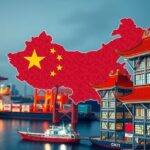China’s Commitment to Foreign Investment Amid Trade Tensions
China has pledged to maintain a supportive environment for foreign investment, particularly from U.S. companies, despite imposing retaliatory tariffs. Vice Commerce Minister Ling Ji emphasized the protection of American businesses and the need for cooperation amid escalating trade tensions. Significant stock market declines occurred in response to these developments.
In a recent statement, a senior Chinese official reaffirmed China’s commitment to being a “safe and promising land” for foreign investment, particularly for U.S. companies. This assurance follows China’s implementation of 34 percent tariffs on U.S. imports, a retaliatory measure against similar tariffs announced by U.S. President Donald Trump.
China has also imposed export controls on seven rare earth elements, which play critical roles in industries such as medical imaging and consumer electronics. Vice Commerce Minister Ling Ji addressed a group of U.S. business representatives, emphasizing that the tariffs were designed to protect the interests of U.S. enterprises operating in China.
Ling noted that the tariffs, effective Thursday, aim to realign the U.S. with a more equitable multilateral trade system. Among those present at the meeting were representatives from prominent companies, including GE Healthcare and Tesla, the latter led by close Trump advisor Elon Musk, who maintains significant business ties in China.
Ling attributed the tariff issue primarily to U.S. actions and encouraged U.S. firms to collaborate in sustaining global supply chains and fostering mutual benefits. In 2024, the United States exported $144.6 billion in goods to China while importing significantly more, totaling $439.7 billion, with electronics and fuels among key export sectors.
Following the trade confrontation, trading floors in Asia experienced significant declines as investors reacted to the geopolitical tensions. Major losses affected various sectors, with tech companies and automotive firms suffering particularly. E-commerce giants such as Alibaba and JD.com saw declines exceeding 14 percent, while SoftBank and Sony also experienced substantial losses.
In conclusion, China’s commitment to being a secure environment for foreign investments, particularly U.S. companies, comes amidst heightened trade tensions. The recent tariffs and export controls reflect China’s efforts to protect its interests while emphasizing the need for cooperative relations with American firms. The ongoing trade situation underscores broader economic implications, impacting global supply chains and investor confidence.
Original Source: www.rfi.fr








Post Comment